
When it comes to oral hygiene, brushing your teeth twice a day is extremely important — but it is just one part of a bigger picture. In order to keep your mouth clean and minimize your risk of cavities and gum disease, you also have to clean the tight spaces in your mouth, such as between your teeth. Since your toothbrush cannot reach into those areas, you should use dental floss or a water flosser. Which option is better? This blog post helps you make a comparison.
Dental Floss Pros and Cons
Dental floss is a staple in oral hygiene routines for a reason. It allows you to physically remove debris and plaque from tight areas between your teeth. Some major advantages of floss include:
- Dental floss is inexpensive, widely available, and easy to carry while traveling.
- You have complete control over the pressure and motion when cleaning between your teeth.
- Floss is effective for removing sticky plaque and food particles from tight spaces. Many dentists believe that it is even more effective than water flossers when it comes to plaque removal.
On the other hand, floss also comes with some downsides:
- Flossing can be difficult if you have braces or dental bridges. Navigating the floss may require that you use a floss threader, which can be tedious.
- Flossing is often challenging or even impossible for individuals with limited dexterity in their hands.
- If you do not use proper technique, you may injure your gums or cause them to bleed.
- Flossing can be time-consuming, especially if you have crowded teeth or sensitive gums.
Water Flosser Pros and Cons
A water flosser, sometimes called an oral irrigator or Waterpik (after a popular brand name of water flosser), uses a focused stream of water to clean between your teeth and around the gumline. This device offers its own set of benefits:
- Water flossers are easy to use, especially for people with braces, implants, or reduced manual dexterity.
- The gentle water stream can help clean along the gumline and massage your gums, which supports gum health.
- Many water flossers have adjustable pressure settings, so you can choose what feels comfortable for you.
Some disadvantages of water flossers that deserve consideration include:
- Water flossers tend to be more expensive than dental floss and require access to electricity or batteries.
- The devices can be bulky, making them less convenient for travel or small bathroom spaces.
- Some studies suggest that water flossers may not remove all plaque as effectively as traditional floss in certain areas of the mouth.
Which Should You Use?
The choice between dental floss and a water flosser depends on your individual needs and preferences. If you value low cost, portability, and control, dental floss may suit you best. If comfort, ease of use, or cleaning around dental work is a priority, a water flosser could offer significant benefits.
Of course, you do not have to choose only one method. Many dental professionals recommend using both for optimal oral hygiene. Ultimately, the most important thing is to clean between your teeth every day, using whichever tool you prefer. Your consistency will greatly reduce your risk of dental problems and allow your smile to shine!
Meet the Practice
Drs. Matt Mauck and Andrew Ricci have worked together for years to provide top-quality oral care to the Aurora, CO, community. They enjoy interacting with patients and providing advice tailored for each individual. If you would like our team to help you design an effective at-home oral hygiene routine that is customized to your circumstances, we would be happy to do so. Contact our office at 303-745-1400 to request an appointment.
